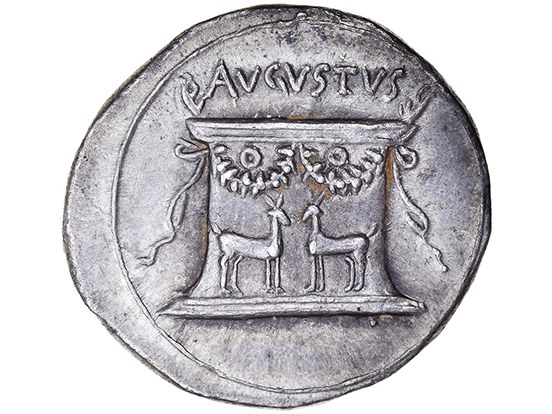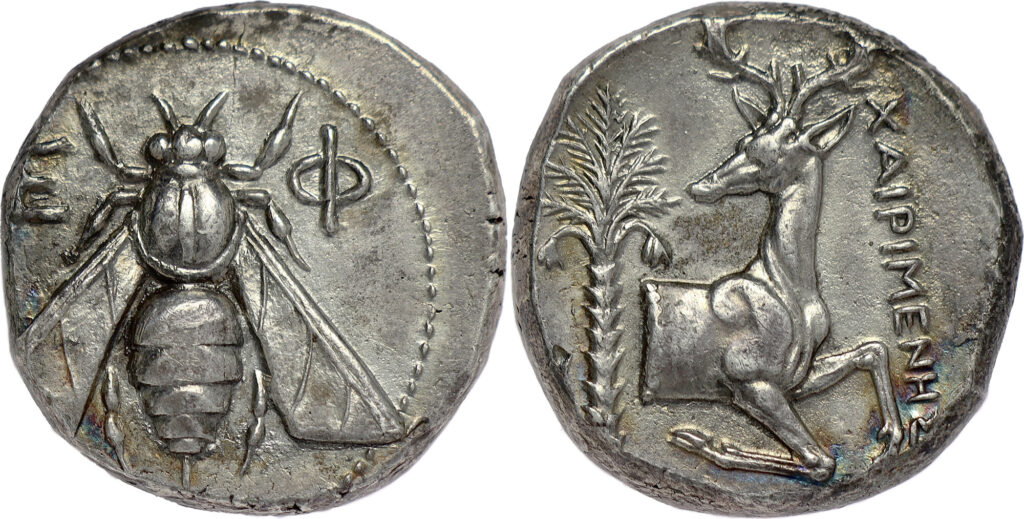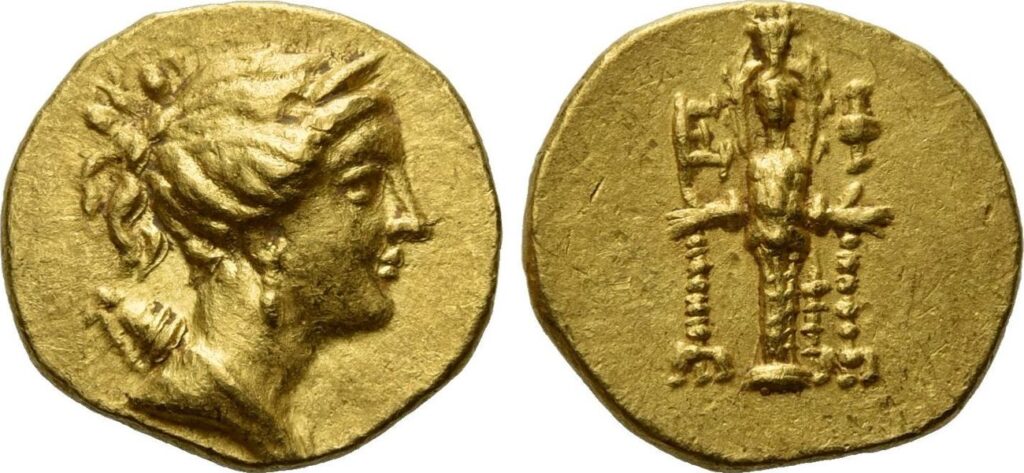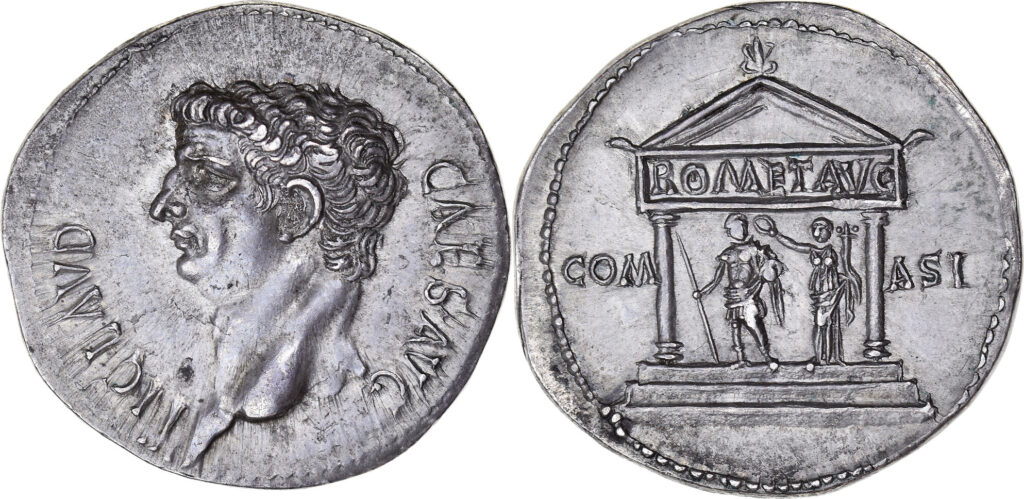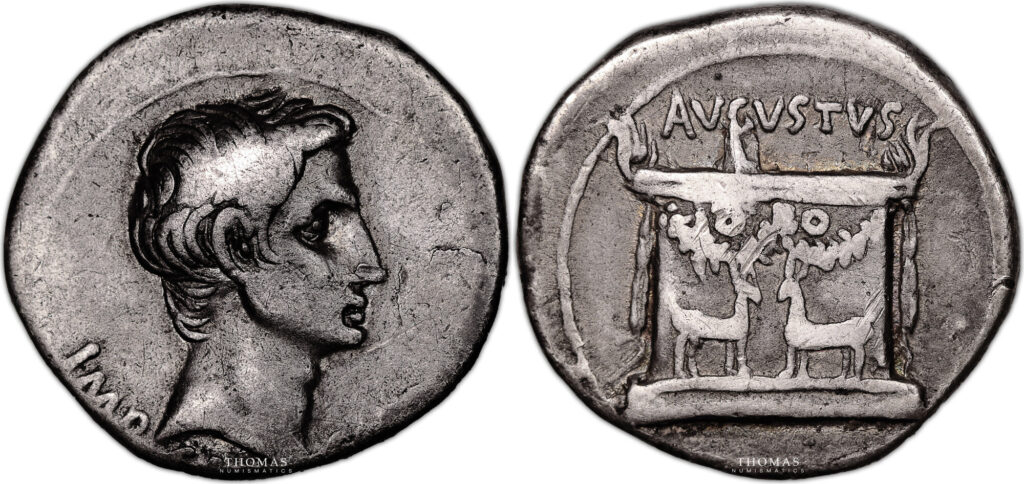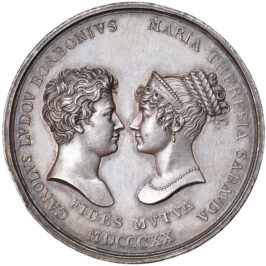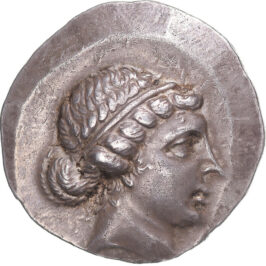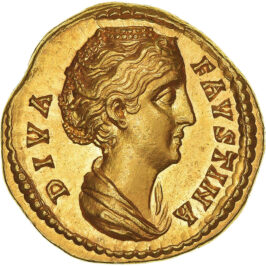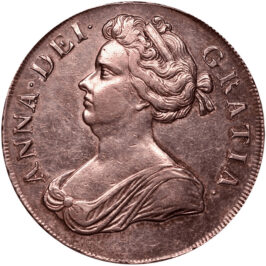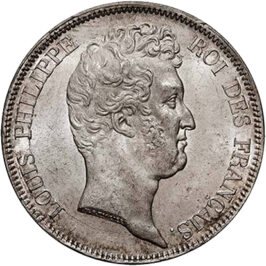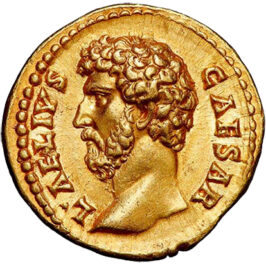Ephesus was one of the great cities of Ionia and an important minting center from the 6th century BC through the Roman Imperial period. These coins are particularly popular with collectors and reflect an important past.
Some of the earliest coins from Ephesus depict the bee and the stag. These date back to the Archaic and Classical Periods (6th-4th centuries BC).
The bee symbolized the priestesses of Artemis (sometimes called “Melissae,” meaning bees). The stag represented the sacred animal of Artemis, whose famous temple (the Artemision, one of the Seven Wonders of the Ancient World) stood in Ephesus.
The bee usually appeared on the obverse, the stag on the reverse.
In the subsequent Hellenistic period (3rd-1st century BC), the bee and deer motifs were often continued on coins. Later coins show portraits of Hellenistic kings who ruled the region (e.g., Lysimachus and the Seleucids). The Temple of Artemis is sometimes depicted.
In the subsequent Roman period (1st-3rd century AD), Ephesus issued bronze and silver coins depicting emperors (Augustus, Hadrian, Antoninus Pius, etc.) combined with Ephesian symbols (bee, deer, temple).
Many Roman provincial coins from Ephesus honor Artemis Ephesia, depicted as a multi-breasted fertility goddess.
Catalog: Pixodarus O123-13
Material: Silver
Weight: 15.17 g – Diameter: 23.70 mm
Obv.: Bee with straight wings within a dotted border; Greek letters Ε (‘epsilon’) and Φ (‘phi’) to either side; wings interrupt the border.
Rev.: Forepart of stag recumbent right, head left; palm tree to left; magistrate’s name in right field, positioned vertically and inward: XAIΡIMENHΣ
Provenance: ex coin dealer Jean-Luc Van der Schueren (Brussels, BE); ex old private collection (BE)
Note: The bee, stag, and palm are all emblems of Ephesos, a Greek city on the west coast of Turkey. This city was an important center of worship for the Greek goddess Artemis, and the images on Ephesian coinage typically promote this association. The bee was originally the symbol of an early Anatolian goddess who the Greeks later identified with their goddess, Artemis; so close was the connection that the priestesses of the goddess were called “honey bees.” The two Greek letters, ? (‘epsilon’) and F (‘phi’), are an abbreviation for Ephesos. The palm tree alludes to Artemis’ birth beneath a palm tree on the island of Delos. The stag – an animal sacred to Artemis – symbolizes the goddess’ role as protector of wild animals, and may also refer to the sculptures that flanked her cult statue in the temple at Ephesos.
Asia Minor Ionia AV Stater (123-119 BC) Ephesus, rare, VF-EF
12,570.00 US$
Material: Gold
Weight: 8.47 g
Catalog: Gulb.985; M&M AG 41,191; Jenk.Hell.184
Obv: Draped bronze of Artemis right, with quiver, wearing earrings and stephane.
Rev: Cult statue of Artemis Ephesia.
Cistophorus 41-42 Ephesos Claudius, Silver, NGC, RIC:120 AU 5/5-4/5
18,540.00 US$
Material: Silver
Weight: 11.14 g -Diameter: 27.00 mm
Pedigree: crowned in distyle temple
Mint mark: Ephesos
Head of Claudius, bare, left, Distyle temple of Roma and Augustus, in which is standing facing figures of Divus Augustus (or Claudius), holding scepter and globe, being crowned by Fortuna, holding cornucopia; ROM ET AVG on entablature.,
Strike: 5/5 Surface: 4/5. Rare and in exceptional state of preservation. A bold portrait perfectly struck in high relief and a lovely cabinet tone. From the collection of a connoisseur.
Ex. Sternberg VIII, Zurich 1978, no. 475. RIC I² Claudius 120 (Pergamum), RPC I, 2221 (Ephesus)., TI CLAVD – CAES AVG, ROM ET AVG / COM ASI
NGC certificate number: 6639646-008
Roman Cistophore 24-20 BC Roman – Augusta – Cistophorus VF
1,640.00 US$
Material: Silver
Weight: 11.62 g – Diameter: 25.00 mm
City: Asia , Ephesus
Rarity: Very rare
Augusta nice struck. Nice reverse with grey patina.
References : RIC.482
About Us:
MA-Shops.com, The World’s Most Trusted Numismatic Marketplace, offers more than a million ancient, U.S. and ancient coins, along with medals, banknotes, militaria and antiquities. Our vibrant collection is offered by verified and Certified Dealers from around the world. Collectors can search, select and purchase conveniently and confidently knowing every item is authentic and guaranteed. Founded in 2005 by Joachim Schwiening, MA-Shops has offices in Germany and the US.
To become a dealer or for more information, contact us at MA-Shops.com


